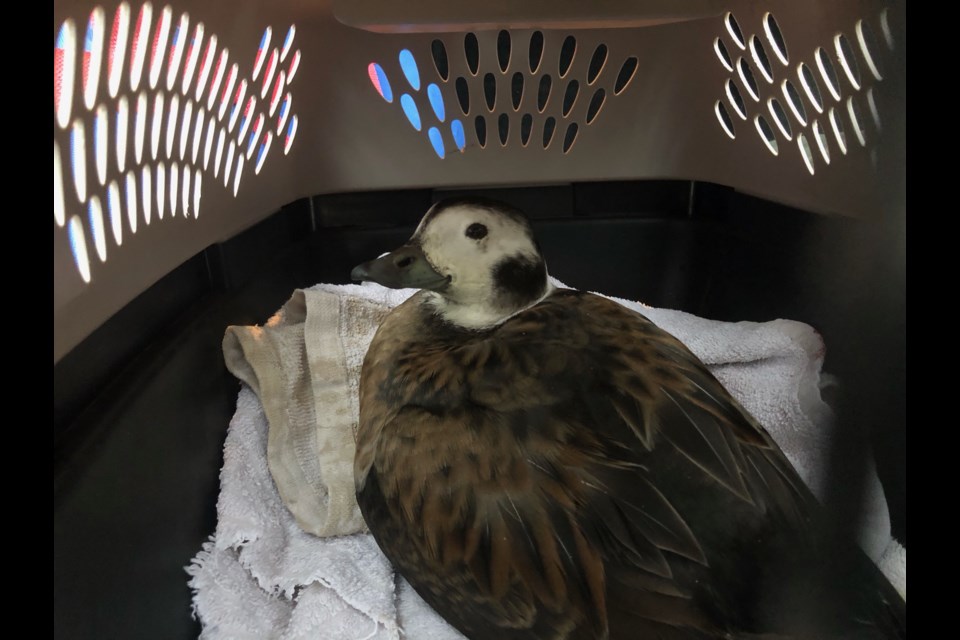During a recent stroll along the beach, a Tiny Township resident found 46 dead ducks along a less-than two-kilometre-long stretch of beach.
Another resident has a bit of a happier tale about her encounter with a duck.
Spo Koledin, who has a cottage near Lafontaine, found a very sick long-tailed duck along the vast Georgian Bay shoreline during a recent walk. The duck wasn’t moving and its eyes were closed and its head was hanging down, but it was still breathing, all tell-tale signs of botulism.
“We found the ducky hiding in the bushes, but not able to walk or even open its eyes, it was about 20 feet from shore,” Koledin says. “The others, who were all dead, were all washed up on shore.”
Her research told her the waterfowl had likely been hit with botulism.
She and her 10-year-old daughter Mary-Grace found a cage, placed the sick duck in it and began trying to offer sustenance in the form of Georgian Bay whitefish and seaweed and used a syringe to give it water since dehydration is also an issue with botulism.
"Each day I was in a panic because he wouldn't eat," Koledin explains.
She eventually contacted Gail Lenters from Shades of Hope Wildlife Refuge in Pefferlaw, who told her the best thing to give the duck was live minnows.
“I've nicknamed my beach 'Botulism Bay,’” says Koledin, whose permanent residence is in Cookstown. “I just need to make a sign now.”
And while they always washed their hands well after having any contact wit the duck, Koledin says she’s also become somewhat of an expert on botulism and its devastating effects this deadly toxin has on waterfowl.
“My blame went from pollution from too many cottagers; to blaming the marinas where diesel is a good food for some bacteria, and in the fall mariners may dump fuel to winterize their boats."
But now, her scientific research has found two invasive species (goby fish and zebra mussels) ,may have created a perfect storm for botulism to grow.
“Apparently zebra mussels do filter the water, more sunlight goes through, algae live and die, and phosphorous helps feed things more down deep in the lakes,” she says, noting this affects diving ducks and loons that are able to go down as far as 45 meters.
“When two conditions are met with lower freshwater levels and warmer surface water in the summer, botulism seems to just thrive.”
The botulism bacterium “is the most toxic natural substance on Earth,” Stephen Riley, a fisheries biologist with the U.S. Geological Survey, says in an article published in the Great Lakes Echo.
“Just one gram could kill off like 2 million people. And for these birds, it’s essentially just widespread food poisoning.”
But unlike the tale of so many waterfowl washing up along Georgian Bay’s shorelines, this one does have a happy ending for the duck found days earlier hiding behind the bushes with its eyes closed.
Four days later, Koledin and her family drove to Lake Simcoe to release their new feathered friend.
They stood quietly along the shoreline with their Yorkie Jack and watched “ducky” swim away into the distance.
